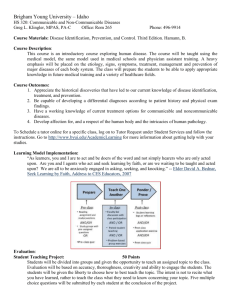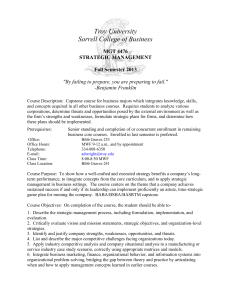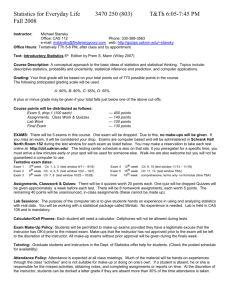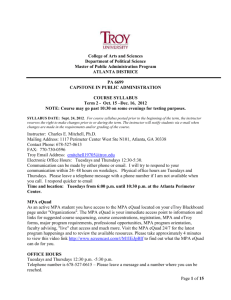Chapter 3 Legal Process - the Sorrell College of Business at Troy
advertisement
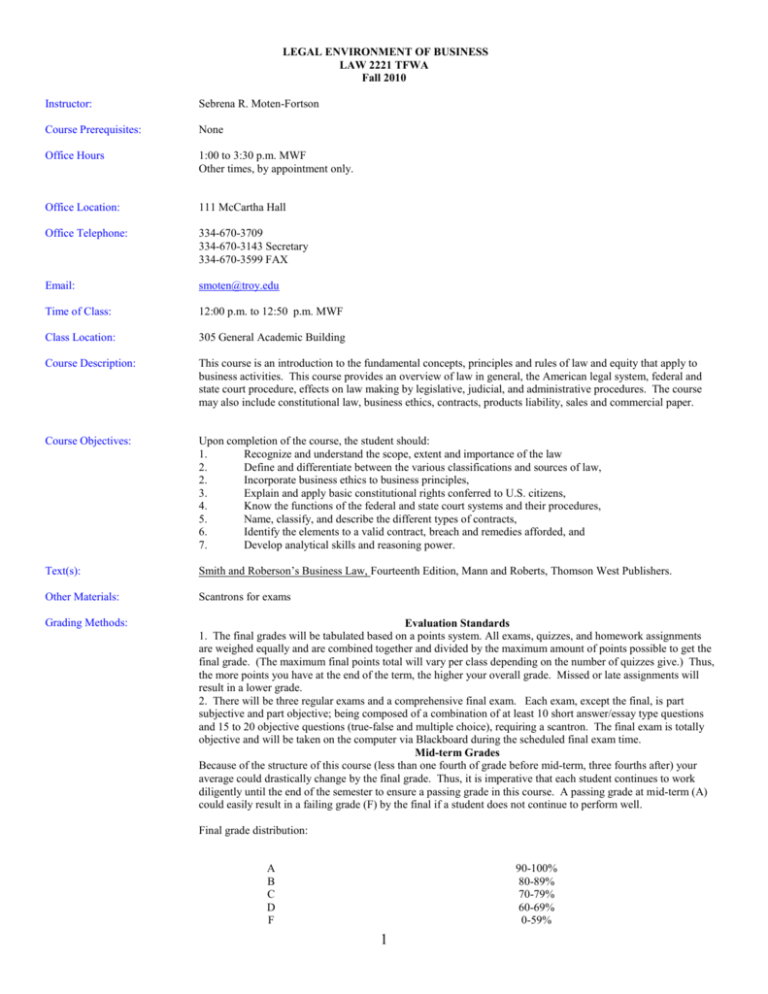
LEGAL ENVIRONMENT OF BUSINESS LAW 2221 TFWA Fall 2010 Instructor: Sebrena R. Moten-Fortson Course Prerequisites: None Office Hours 1:00 to 3:30 p.m. MWF Other times, by appointment only. Office Location: 111 McCartha Hall Office Telephone: 334-670-3709 334-670-3143 Secretary 334-670-3599 FAX Email: smoten@troy.edu Time of Class: 12:00 p.m. to 12:50 p.m. MWF Class Location: 305 General Academic Building Course Description: This course is an introduction to the fundamental concepts, principles and rules of law and equity that apply to business activities. This course provides an overview of law in general, the American legal system, federal and state court procedure, effects on law making by legislative, judicial, and administrative procedures. The course may also include constitutional law, business ethics, contracts, products liability, sales and commercial paper. Course Objectives: Upon completion of the course, the student should: 1. Recognize and understand the scope, extent and importance of the law 2. Define and differentiate between the various classifications and sources of law, 2. Incorporate business ethics to business principles, 3. Explain and apply basic constitutional rights conferred to U.S. citizens, 4. Know the functions of the federal and state court systems and their procedures, 5. Name, classify, and describe the different types of contracts, 6. Identify the elements to a valid contract, breach and remedies afforded, and 7. Develop analytical skills and reasoning power. Text(s): Smith and Roberson’s Business Law, Fourteenth Edition, Mann and Roberts, Thomson West Publishers. Other Materials: Scantrons for exams Grading Methods: Evaluation Standards 1. The final grades will be tabulated based on a points system. All exams, quizzes, and homework assignments are weighed equally and are combined together and divided by the maximum amount of points possible to get the final grade. (The maximum final points total will vary per class depending on the number of quizzes give.) Thus, the more points you have at the end of the term, the higher your overall grade. Missed or late assignments will result in a lower grade. 2. There will be three regular exams and a comprehensive final exam. Each exam, except the final, is part subjective and part objective; being composed of a combination of at least 10 short answer/essay type questions and 15 to 20 objective questions (true-false and multiple choice), requiring a scantron. The final exam is totally objective and will be taken on the computer via Blackboard during the scheduled final exam time. Mid-term Grades Because of the structure of this course (less than one fourth of grade before mid-term, three fourths after) your average could drastically change by the final grade. Thus, it is imperative that each student continues to work diligently until the end of the semester to ensure a passing grade in this course. A passing grade at mid-term (A) could easily result in a failing grade (F) by the final if a student does not continue to perform well. Final grade distribution: A B C D F 90-100% 80-89% 70-79% 60-69% 0-59% 1 1. 2. HOMEWORK POLICY: Assignments will be taken up for a grade. To be considered on time they must be handed in at the beginning of class. To get credit for assignments the student must do the following: a. Hand in before start of lecture. If you arrive late, homework will be considered late and the grade penalized. b. If student is not in class, the homework must still be handed at the beginning of class or to the secretary before class. Do not place assignments under my office door. c. When completing homework assignments, do not write on the back of the paper. Any work written on the back of the paper will not be graded. Cut off ragged ends. d. With each assignment, you must be able to get your point across completely and coherently. Also, your handwriting must be legible. If I cannot read it, I cannot grade it! e. ALL work turned in for a grade must be PLEDGED! This means you did not give any help, receive any help or know of anyone receiving any help! QUIZ POLICY: Quizzes will NOT be announced and there will be no make-ups. They will be given either at the beginning or at end of class. Thus, if you are late, or leave early, you will not be able to make up the missed quiz. Please remember: you cannot make up a quiz! TEST POLICY: Make-up exams will be given only for documented (on letterhead), approved absences. See ATTENDANCE POLICY. Make up exams are administered only to students who have received approval from the professor prior to the test date. The make-up exam must be taken within one week of the student's return to class. Makeups are different from exams given in class. A grade of zero will be assigned for an exam missed due to an unexcused absence. During terms when multiple sections are being taught, do not request to take an exam with another section. You must take the exam at the time designated for your class. Vision Statement and Mission Statement of the Sorrell College of Business VISION STATEMENT Sorrell College of Business will be the first choice for higher business education students in their quest to succeed in a dynamic and global economy. Sorrell College of Business will create the model for 21st century business education and community service. MISSION STATEMENT Through operations that span the State of Alabama, the United States, and the world, Sorrell College of Business equips our students with the knowledge, skills, abilities, competencies to become organizational, and community leaders who make a difference in the global village and global economy. Through this endeavor, we serve students, employers, faculty, and Troy University at large as well as the local and global communities. 2 Class Procedure and Requirements: Examinations, homework assignments, quizzes, and class participation will be the criteria for grades. The approach used will be classroom lecture covering concepts and case studies. Class participation and discussion is strongly encouraged. The student will be expected to attend scheduled class meetings, complete reading assignments prior to class, and to complete any homework by the assigned due date. COURSE CONTENT AND TENATIVE CLASS SCHEDULE Part I The Legal Environment of Business Chapter 1 Introduction to Law (No cases) Business Ethics and the Social Responsibility of Business (no readings) Chapter 3 Legal Process Case 3-2 World-wide Volkswagen Corp. v Woodson Case 3-3 Parker v Twentieth Century – Fox Film Corp. Case 3-4 Circuit City Stores, Inc. v Saint Clair Adams Chapter 4 Constitutional Law Case 4-1 Silkwood v Kerr-McGee Corporation Case 4-2 Brentwood Academy v Tennessee Secondary School Athletic Association Case 4-3 Granholm v Heald Case 4-4 Thompson v Western States Medical Center Case 4-5 Brown v Board of Education of Topeka EXAM Part II Contacts Chapter 9 Introduction to Contracts Case 9-2 Steinberg v Chicago Medical School Case 9-3 Skebba v Kasch Chapter 10 Mutual Assent Case 10-1 Catamount Slate Products, Inc. Sheldon Case 10-2 Lefkowitz v Great Minneapolis Surplus Store, Inc. Case 10-3 Sherrod v Kidd Case 10-4 Osprey L.L.C. v Kelly-Moore Paint Co. Inc. Chapter 11 Conducting and Invalidating Consent Case 11-1 Berardi v Meadowbrook Mall Company Case 11-2 Rea v Paulson Case 11-3 Maroun v Wyreless System, Inc. Case 11-4 Reed v King Case 11-5 Lehser v Strid Chapter 12 Consideration Case 12-1 Pearsall v Alexander Case 12-2 Denney v Reppert Case 12-3 New England Rock Services, Inc. v Empire Paving, Inc. Case 12-4 Dilorenzo v Valve and Primer Corporation Chapter 14 Contractual Capacity Case 14-2 In re The Scoreboard, Inc. Case 14-3 Zelnick v Adams Case 14-4 First State Bank of Sinai v Hyland Chapter 17 Performance, Breach, and Discharge Case 17-1 Silvestri v Optus Software, Inc. Case 17-2 Associated Builders, Inc. v William M. Coggins et al Case 17-3 Hochster v De La Tour Case 17-4 Northern Corp. v Chugach Electrical Association Chapter 18 Remedies (No cases) EXAM Part IV Sales Chapter 21 Introduction to Sales and Leases Case 13-4 Williams v Walker-Thomas Furniture Co. Case 21-3 Construction Associates, Inc. v Fargo Water Equipment Co. Chapter 24 Products Liability: Warranties and Strict Liability in Tort Case 24-1 Felley v Singleton Case 24-4 Kelso v Bayer, Corporation Case 24-5 Greene v Boddie-Noell Enterprises, Inc EXAM COMPREHENSIVE FINAL EXAM 3 CLASSROOM ADMINISTRATION 1. Participation is vital in understanding the different concepts; therefore, it is important that you read each assignment before coming to class. Read the textbook before coming to class. Bonus points will be given for constructive class participation. At the end of the term, these points will be added to your point totals. It is to your advantage to utilize this resource to ensure a good grade. 2. Preparation is not only suggested, it is essential. However, just as points can be awarded for being prepared, surprise quizzes will be given when the class consistently comes unprepared. 3. Be responsible for all instructions and assignments given in class as well as for the supporting textbook content. 3. Hand in assignments on the assigned due date. 4. All exams must be turned in after each review. Grades will not be recorded until all exams are returned after each review. A penalty will be assessed to the entire class if anyone refuses to abide by the rules. 5. ALL work turned in for a grade must be PLEDGED! 6. Cell phones need to be turned off during class. If they ring, they are subject to confiscation. 7. Please check your troy.edu account regularly. Any class announcements will be sent there. 8. No electronic devices will be allowed during exams. This includes, but is not limited to, cell phones, dictionaries, interpreters, etc… If you are found in possession of any of these items, the item and exam will be taken away and you will be assigned the grade of “0” on the exam and subject to disciplinary actions. USE OF CELL PHONE AND OTHER ELECTRONIC DEVICES: Use of any electronic devise by students in the instructional environment is prohibited unless explicitly approved on a case-by-case basis by the instructor of record or by the Office of Disability Services in collaboration with the instructor. Cellular phones, pagers, and other communication devices may be used for emergencies, however, but sending or receiving non-emergency messages is forbidden by the University. Particularly, use of a communication device to violate the Troy University “Standards of Conduct” will result in appropriate disciplinary action (See the Oracle.) In order to receive emergency messages from the University or family members, the call receipt indicator on devices must be in the vibration mode or other unobtrusive mode of indication. Students receiving calls that they believe to be emergency calls must answer quietly without disturbing the teaching environment. If the call is an emergency, they must move unobtrusively and quietly from the instructional area and notify the instructor as soon as reasonably possible. Students who are expecting an emergency call should inform the instructor before the start of the instructional period. General Supports: The computer labs in 119 McCartha Hall and 207 McCartha Hall are available for student use. Additional Services: AMERICANS WITH DISABILITIES ACT: Any student whose disabilities fall within ADA must inform the instructor at the beginning of the term of any special needs or equipment necessary to accomplish the requirements for this course. Troy University supports Section 504 of the Rehabilitation Act of 1973 and the Americans with Disabilities Act of 1990, which insure that postsecondary students with disabilities have equal access to all academic programs, physical access to all buildings, facilities and events, and are not discriminated against on the basis of disability. Eligible students, with appropriate documentation, will be provided equal opportunity to demonstrate their academic skills and potential through the provision of academic adaptations and reasonable accommodations. Further information, including appropriate contact information, can be found at the link for Troy University’s Office of Human Resources at http://www.troy.edu/humanresources/ADAPolicy2003.htm Students who have or may be dealing with a disability or learning difficulty should speak with the instructor, contact the Office of Adaptive Needs Program (215 Adams Center), or call 670-3220/3221. Various accommodations are available through the Adaptive Needs Program. The faculty in the School of Business makes every effort to accommodate unique and special needs of students with respect to speech, hearing, vision, seating, or other possible disabling conditions. Please notify the instructor as soon as possible of requested accommodations or ways to help. TAPE RECORDINGS ARE STRICTLY PROHIBITED! Any violators will be prosecuted! (If because of a medical reason this devise is deemed necessary, I must receive proof from Student Services before you will be allowed to use the recorder and there will still be restrictions.) Other Information: 4 Class Roll: Class roll will be passed at the beginning of the class session. It is the student’s responsibility to make sure that your name is on the class roll. It is an ethical code violation to sign someone else’s name to the roll. If this happens, the guilty party(ies) will be disciplined according to the Student Handbook. 2. Attendance is mandatory. Because of the complexity of the subject matter, amount of material to be covered, and limited number of class days, absences are not recommended. Attendance will be taken every day. Missing an excessive number of days can result in the lowering of your grade. I do not repeat lectures nor perform the tutoring function for students who are absent. Each absence will make the successful completion of this course more difficult, since most of this course is cumulative in nature and days missed from class are lost knowledge. Exams will include not only the material from the assigned chapters in the text, but also from any other materials covered in class lectures. 3. Excused absences: Excused absences have the following characteristics: a. Professor was informed prior to the absence. b. Professor determines that the absence is excused. c. Absence is of the following type: 1. Participation in a documented official university function that does not permit the student’s class attendance (e.g., participation in athletic events, field trips, etc.) 2. Severe illness (this does not include scheduled medical appointments nor driving someone else to doctor), a hospital stay, or a doctor's excuse saying that it is impossible for student to attend class(es) 3. Death of immediate family member (grandparent, parent, sibling, or child) 4. Appearance in court 5. Personal situations that are approved by the professor in advance of the time the student is to be absent. d. Written documentation (on letterhead) must be provided. 4. Tardiness will not be tolerated! Please respect other wanting to get an education by being on time for class. Gross tardiness will not be tolerated. If this becomes a problem, you will not be allowed to enter the classroom once the lecture has started. If you are to leave before the lecture is over, please clear it with me first, to cut down on added distractions for the class! Attendance Policy: 1. Incomplete Work Policy: Any incomplete work at the end of the term will not be accepted unless the student can provide acceptable and clear documentation prior to grades being submitted to the Registrar. Cheating Policy: One of the professional responsibilities of business is to be ethical. Thus, it is expected of each student to be honest and not receive nor give any help on an exam, quiz or homework assignment. If any student is found in violation of this policy, he/she will be immediately removed from the class, referred to the appropriate governing body and disciplined accordingly. If you are caught cheating, you will get a course grade of "F". See ORACLE: Student Handbook, 2002-2003 pp. 86-87. Plagiarism is the act of stealing and passing off (the ideas or words of another) as one’s own or to commit literary theft: present as new and original an idea or product derived from an existing source (Webster’s New Collegiate Dictionary). Plagiarism will cause a student to get a course grade of “F”. According to the TSU ORACLE: Student Handbook, 2002-2003, pp. 81, one definition of misconduct is: “Dishonesty, such as cheating, plagiarism...”. The ORACLE states on pp. 86 under the Academic Code sub-heading that: “A student is subject to disciplinary action: #3. Where the work affects or might affect a student’s grade, credit, or status in the university, a student represents to be his or her own any work which is not the product of his or her own study and efforts”. The penalty for such misconduct may be (pp. 87) “A student’s grade in the course or on the examination affected by the misconduct may be reduced to any extent, including a reduction to failure.” A student may be suspended from the university for a specific or an indefinite period. p. 86-87. Daily Assignments: First day of class Deadline for adding course Last day to drop without financial penalty Last day to drop a course without academic penalty Holiday (Labor Day) Fall Break Last day to remove incomplete grade from previous term Last day to withdraw without academic penalty Holiday (Veterans Day) Fall Break Thanksgiving Break Classes end Dead day Final Examination 5 August 11 August 16 August 16 October 15 September 6 November 23 -24 October 15 October 15 November 11 November 22-23 November 24-28 November 30 December 1 December 2, Thursday, 2:00 p.m. –4:00 p.m.
